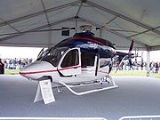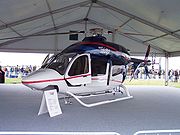
Bell 429
Encyclopedia
The Bell 429 is a light, twin-engine helicopter developed by Bell Helicopter and Korea Aerospace Industries, based on the Bell 427
. First flight of the Bell 429 prototype took place on February 27, 2007, and received type certification on July 1, 2009. The Bell 429 is capable of single-pilot IFR and Runway Category A operations. The Bell 429 costs approximately US$5 million as of early 2010.
(EMS) industry, which has been looking for an updated helicopter. The Bell 427
was originally intended to address this market, but the 427's small cabin size would not adequately accommodate a patient litter, and the systems did not support instrument flight rules
(IFR) certification. Bell's original concept for the 429 was a stretched model 427 (unveiled as the Bell 427s3i at the 2004 HAI helicopter show), but this still did not provide what Bell and its customer advisers were looking for.
 Bell abandoned the 427 airframe and went to its MAPL (Modular Affordable Product Line) concept airframe that was still in conceptual development at the time. The 429 employs the all-new modular airframe concept and the advanced rotor blade design from the MAPL program, but maintains a derivative engine and rotor drive system from the 427. The basic model includes a glass cockpit and is certified for single pilot IFR. Bell partnered with Korea Aerospace Industries and Mitsui Bussan Aerospace of Japan in the helicopter's development.
Bell abandoned the 427 airframe and went to its MAPL (Modular Affordable Product Line) concept airframe that was still in conceptual development at the time. The 429 employs the all-new modular airframe concept and the advanced rotor blade design from the MAPL program, but maintains a derivative engine and rotor drive system from the 427. The basic model includes a glass cockpit and is certified for single pilot IFR. Bell partnered with Korea Aerospace Industries and Mitsui Bussan Aerospace of Japan in the helicopter's development.
Bell had flown most of the critical MAPL technology components using a 427 test bed aircraft by February 2006. The first completed 429 flew February 27, 2007. Certification was originally planned for late 2007, but program schedule delays, primarily caused by parts and material shortages common to all aviation manufacturers in that time period, caused the manufacturer to stretch the development timetable. In October 2007 the external configuration was set. In February 2008, Bell had three 429s in flight testing that had completed 600 hours.
The helicopter received type certification from Transport Canada Civil Aviation (TCCA) on July 1, 2009, and from Federal Aviation Administration
(FAA) by July 7, 2009. EASA certification was announced at Helitech on September 24, 2009.
As of June 2009, the Bell 429 had received over 301 orders. The launch customer for the Bell 429 is Air Methods Corporation
, the largest medevac
provider in the United States. On July 7, 2009, the first customer aircraft (s/n 57006) was delivered to Air Methods (owner) and Mercy One (operator) at Bell's facility in Mirabel, Canada.
The 429 conducted its high altitude certification testing at Leadville, Colorado and its high temperature certification at Lake Havasu City, Arizona. Further testing is also underway to establish maximum speeds (Vne) and climb rates (Vy) for operation with various door configurations (fixed, sliding, pilot, passenger, doors off).
The 429 has glass cockpit with 3-axis autopilot and flight director standard. Standard landing gear are skids. A retractable wheel landing gear is optional and adds 5 kt to cruising speed. The helicopter is a single-pilot IFR Category A helicopter. It is capable of operating with one engine inoperative. The main transmission is rated for 5,000 hours between overhauls and the tail-rotor gearbox is rated for 3,200 hours.
Bell 427
|-See also:-References:* . Bell Helicopter-External links:*...
. First flight of the Bell 429 prototype took place on February 27, 2007, and received type certification on July 1, 2009. The Bell 429 is capable of single-pilot IFR and Runway Category A operations. The Bell 429 costs approximately US$5 million as of early 2010.
Development
The impetus for developing the Bell 429 came primarily from the emergency medical servicesEmergency medical services
Emergency medical services are a type of emergency service dedicated to providing out-of-hospital acute medical care and/or transport to definitive care, to patients with illnesses and injuries which the patient, or the medical practitioner, believes constitutes a medical emergency...
(EMS) industry, which has been looking for an updated helicopter. The Bell 427
Bell 427
|-See also:-References:* . Bell Helicopter-External links:*...
was originally intended to address this market, but the 427's small cabin size would not adequately accommodate a patient litter, and the systems did not support instrument flight rules
Instrument flight rules
Instrument flight rules are one of two sets of regulations governing all aspects of civil aviation aircraft operations; the other are visual flight rules ....
(IFR) certification. Bell's original concept for the 429 was a stretched model 427 (unveiled as the Bell 427s3i at the 2004 HAI helicopter show), but this still did not provide what Bell and its customer advisers were looking for.

Bell had flown most of the critical MAPL technology components using a 427 test bed aircraft by February 2006. The first completed 429 flew February 27, 2007. Certification was originally planned for late 2007, but program schedule delays, primarily caused by parts and material shortages common to all aviation manufacturers in that time period, caused the manufacturer to stretch the development timetable. In October 2007 the external configuration was set. In February 2008, Bell had three 429s in flight testing that had completed 600 hours.
The helicopter received type certification from Transport Canada Civil Aviation (TCCA) on July 1, 2009, and from Federal Aviation Administration
Federal Aviation Administration
The Federal Aviation Administration is the national aviation authority of the United States. An agency of the United States Department of Transportation, it has authority to regulate and oversee all aspects of civil aviation in the U.S...
(FAA) by July 7, 2009. EASA certification was announced at Helitech on September 24, 2009.
As of June 2009, the Bell 429 had received over 301 orders. The launch customer for the Bell 429 is Air Methods Corporation
Air Methods
Air Methods, Corp. is the largest publicly owned emergency medical services helicopter operator in the United States, with a fleet of over 300 medical transport helicopters that average 85,000 transports and 100,000 flight hours per year as of December 2006....
, the largest medevac
MEDEVAC
Medical evacuation, often termed Medevac or Medivac, is the timely and efficient movement and en route care provided by medical personnel to the wounded being evacuated from the battlefield or to injured patients being evacuated from the scene of an accident to receiving medical facilities using...
provider in the United States. On July 7, 2009, the first customer aircraft (s/n 57006) was delivered to Air Methods (owner) and Mercy One (operator) at Bell's facility in Mirabel, Canada.
The 429 conducted its high altitude certification testing at Leadville, Colorado and its high temperature certification at Lake Havasu City, Arizona. Further testing is also underway to establish maximum speeds (Vne) and climb rates (Vy) for operation with various door configurations (fixed, sliding, pilot, passenger, doors off).
Design
The Bell 429 has a 4-blade rotor system with soft-in-plane flex beams. The rotor blades are composite and have swept tips for reduced noise. The tail rotor is made by stacking two, two-blade rotors set at uneven intervals (to form an X) for reduced noise. The combined cabin volume is 204 ft³ (5.78 m³) with a 130 ft³ passenger cabin and 74 ft³ baggage area, with flat floor for patient loading. A set of rear clamshell doors under tail boom is optional for easier patient loading.The 429 has glass cockpit with 3-axis autopilot and flight director standard. Standard landing gear are skids. A retractable wheel landing gear is optional and adds 5 kt to cruising speed. The helicopter is a single-pilot IFR Category A helicopter. It is capable of operating with one engine inoperative. The main transmission is rated for 5,000 hours between overhauls and the tail-rotor gearbox is rated for 3,200 hours.
Operators
- Royal Australian NavyRoyal Australian NavyThe Royal Australian Navy is the naval branch of the Australian Defence Force. Following the Federation of Australia in 1901, the ships and resources of the separate colonial navies were integrated into a national force: the Commonwealth Naval Forces...
- 723 Squadron RAN723 Squadron RAN723 Squadron is a Royal Australian Navy Fleet Air Arm squadron.-History:723 Squadron was first commissioned into the RAN on 7 April 1952 and was equipped with one Dakota, one Wirraway, one Sea Otter and two Sea Fury aircraft...
(3 aircraft from 2012) - Fairfax County Police DepartmentFairfax County Police DepartmentThe Fairfax County Police Department is a full-service law enforcement agency, located in northern Virginia. The FCPD services a population of 1,081,726 citizens within of Fairfax County, Virginia....
, Fairfax County, VirginiaFairfax County, VirginiaFairfax County is a county in Virginia, in the United States. Per the 2010 Census, the population of the county is 1,081,726, making it the most populous jurisdiction in the Commonwealth of Virginia, with 13.5% of Virginia's population...
(1 aircraft being outfitted/trained on + 1 additional delivered in FY2012) - Mercy Medical Center, Des Moines, IowaIowaIowa is a state located in the Midwestern United States, an area often referred to as the "American Heartland". It derives its name from the Ioway people, one of the many American Indian tribes that occupied the state at the time of European exploration. Iowa was a part of the French colony of New...
- San Juan Regional Medical CenterSan Juan Regional Medical CenterSan Juan Regional Medical Center is a 250-licensed-bed, Level-III Trauma Center that provides healthcare to the Four Corners region of New Mexico, Arizona, Utah and Colorado. In October 2010, SJRMC received a three-year accreditation by Det Norske Veritas . Our organization was evaluated in...
, Farmington, NM
- 723 Squadron RAN
Specifications (Bell 429)
External links
- Bell 429 on manufacturer's site
- Bell429.com, Bell's site for helicopter
- Bell 429 page on aerospace-technology.com
- Bell 429, a Surprisingly Big Little Twin. Aviation Week
- Bell 429 pilot report. Aviation International News
- Global Ranger (Bell 429) demonstration tour. Heli Drop Zone report about Bell 429 demo tour in Switzerland

